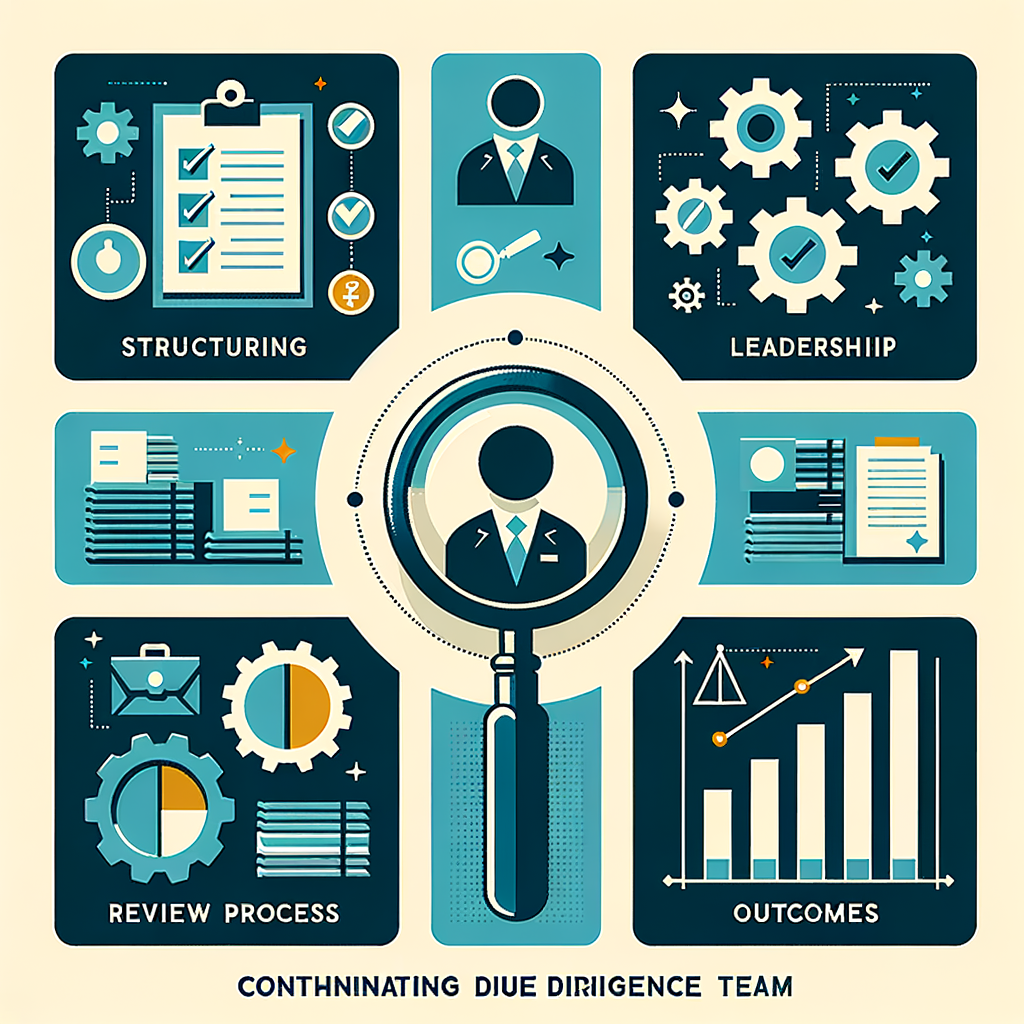How do you structure and lead a due diligence team?
Picture this: you’re an ambitious entrepreneur in India, on the verge of a game-changing move. Maybe you’re acquiring a smaller competitor to expand your market reach, securing a significant investment to scale your operations, or entering a strategic partnership that promises explosive growth. The excitement is palpable, but so are the risks lurking beneath the surface. To navigate this critical phase successfully, you need more than just a gut feeling; you need a thorough investigation, a process known as due diligence. The success of this crucial investigation, which verifies all facts and uncovers potential liabilities before a deal is signed, depends almost entirely on having a well-defined due diligence team structure and strong, effective leadership. This comprehensive guide will provide a clear roadmap for structuring, building, and leading a high-performing due diligence team in the unique Indian business landscape.
The Foundation: Why a Solid Due Diligence Team Structure Matters
Jumping into a due diligence process without a clear plan is like trying to build a house without a blueprint. It leads to chaos, missed deadlines, and, most dangerously, costly oversights that can jeopardize your entire investment. A formal due diligence team structure is the foundation that prevents this chaos. It transforms the investigation from a haphazard collection of inquiries into a methodical, strategic review that ensures every critical angle of the target business is meticulously examined. By defining roles and creating a clear hierarchy, you establish a system of checks and balances that is essential for a comprehensive analysis. This structured approach is not just about efficiency; it’s about building a fortress of information to protect your financial interests and empower you to make decisions with confidence, fully aware of all potential risks and opportunities.
A well-organized structure provides several tangible benefits that are particularly relevant in the Indian context:
- Ensures Comprehensive Coverage: A structured team with designated experts ensures that no stone is left unturned. Key areas such as financial health, legal compliance, tax history, and operational efficiency are all given the specialized attention they deserve.
- Creates Clear Accountability: When specific roles are assigned, accountability is inherent. The financial analyst is responsible for the numbers, the lawyer for legal risks, and so on. This eliminates ambiguity and ensures that each member takes ownership of their domain.
- Streamlines the Due Diligence Process for Teams: A clear structure and defined communication channels prevent duplicate work and information silos. This streamlined process saves invaluable time, reduces costs associated with the investigation, and helps maintain momentum toward closing the deal.
- Mitigates Risks Specific to the Indian Market: India’s business environment has unique complexities, from intricate state-level regulations to hidden statutory liabilities related to provident fund (PF) or employee state insurance (ESI). A dedicated team structure ensures you have specialists who can identify and assess these specific, localized risks.
Building Your A-Team: Key Due Diligence Team Roles & Responsibilities
A successful due diligence exercise is a team sport, requiring a diverse set of skills to analyze a business from every possible angle. The complexity of the transaction will dictate the size of your team, but a few core roles are almost always non-negotiable. Understanding these due diligence team roles responsibilities is the first step in assembling your expert lineup. Whether you are acquiring a small local business or merging with a larger entity, having the right specialists in place is critical to uncovering the complete picture and making an informed decision.
The Team Lead / Project Manager
The Team Lead is the conductor of the orchestra. This individual is the central point of contact and coordination, responsible for the overall execution of the due diligence process. They don’t necessarily need to be the deepest expert in any single area, but they must have a strong understanding of all facets of the investigation. Their primary role is to ensure the team works cohesively and efficiently toward a common goal.
- Responsibilities:
- Sets the overall strategy, scope, and timelines for the project.
- Acts as the primary liaison between the due diligence team, your company’s management, and the target company.
- Assigns specific tasks and checklists to each team member.
- Manages the flow of information and documentation, often overseeing a virtual data room.
- Compiles the findings from all experts into a single, comprehensive, and easy-to-understand due diligence report.
The Financial Analyst / Chartered Accountant (CA)
This is the numbers expert, the person who dives deep into the financial heart of the target company. Often a seasoned Chartered Accountant (CA), their job is to verify that the financial story presented by the company is accurate, sustainable, and free of any hidden red flags. They look beyond the surface-level figures to understand the true financial health and performance of the business.
- Responsibilities:
- Performs a detailed scrutiny of historical financial statements, including the Profit & Loss Account, Balance Sheet, and Cash Flow Statement.
- Analyzes the quality and sustainability of revenue streams and profit margins.
- Examines the company’s debt obligations, working capital management, and overall asset quality.
- Identifies any accounting irregularities, off-balance-sheet liabilities, or aggressive accounting policies.
- Validates the financial projections provided by the target company against historical performance and market trends.
The Legal Counsel / Corporate Lawyer
The Legal Counsel is your compliance guardian, ensuring that the target company is structurally sound and operating within the bounds of Indian law. This role is crucial for identifying potential legal liabilities that could translate into significant financial or reputational damage post-acquisition. They review the corporate skeleton of the business to ensure there are no cracks in its foundation.
- Responsibilities:
- Reviews the company’s corporate records, including its Certificate of Incorporation, Memorandum of Association (MOA), Articles of Association (AOA), and statutory registers available on the Ministry of Corporate Affairs portal.
- Examines all material contracts, including those with major customers, key suppliers, landlords, and employees.
- Investigates any past, pending, or threatened litigation or regulatory actions against the company.
- Verifies ownership of key assets and ensures all necessary licenses, permits, and registrations required to operate legally in India are in place and current.
- Ensures compliance with major Indian laws such as the Companies Act, 2013, FEMA, and various labour laws.
The Tax Specialist
In India, tax compliance is a complex and high-stakes area. The Tax Specialist focuses exclusively on the target company’s tax history and current standing to uncover any hidden liabilities that could become your problem after the deal closes. This expert ensures that there are no lurking demands from tax authorities waiting to surprise you.
- Responsibilities:
- Conducts a thorough review of Goods and Services Tax (GST) returns, reconciliations, and overall compliance. An actionable tip is to verify the company’s GST return filing status directly on the official GST Portal.
- Examines past Income Tax returns, assessment orders, and TDS/TCS compliance records.
- Investigates any ongoing tax disputes, notices, or demands from the Income Tax Department or GST authorities.
- Analyzes the potential tax implications of the transaction structure itself.
- Provides insights into any available tax benefits or potential risks associated with the company’s tax positions.
The Operational Expert
While the other experts focus on financial and legal records, the Operational Expert gets their hands dirty understanding how the business *actually* works. This role is often filled by someone with deep industry experience, or even the business owner themselves, who can assess the day-to-day realities of the company’s operations.
- Responsibilities:
- Assesses the efficiency of key business processes, from manufacturing and supply chain to sales and customer service.
- Evaluates the condition and adequacy of physical assets, technology infrastructure, and inventory management systems.
- Reviews the company’s intellectual property (IP) portfolio, such as trademarks and patents, and their registrations.
- Analyzes the customer base for concentration risks and assesses the company’s competitive positioning in the market.
A Practical Guide: How to Build a Due Diligence Team in India
Knowing the key roles is one thing; assembling them into a functional team is another. For business owners wondering how to build a due diligence team in India, a structured, step-by-step approach can simplify the process and ensure you have the right expertise in place to protect your interests. This framework provides a clear path from initial planning to final execution.
Step 1: Define the Scope and Create a Due Diligence Checklist
Before you even think about hiring experts, you must define what you are looking for. The scope of the due diligence should be directly tied to the nature of the transaction and your specific concerns. Are you primarily worried about financial stability, legal compliance, or operational scalability? Clearly outline the goals of the investigation and, most importantly, identify your “deal-breakers”—the red flags that would cause you to walk away from the transaction. Based on this scope, create a detailed checklist for each area (financial, legal, tax, operational) that will serve as the guiding document for your team.
Step 2: Assemble Your Team: In-House vs. External Experts
Once the scope is clear, assess your internal resources. Do you have a CFO who can handle the financial analysis? Is your in-house counsel equipped for a deep legal dive? Using internal staff can be cost-effective, but it’s crucial to be honest about their expertise and bandwidth. For highly specialized and critical areas like tax and legal due diligence, hiring external professionals is often the wiser choice. External experts, such as the specialized teams at TaxRobo Online CA Consultation Service, bring impartiality, deep domain knowledge of Indian regulations, and a fresh perspective free from internal biases.
| Aspect | In-House Team | External Experts (e.g., TaxRobo) |
|---|---|---|
| Cost | Potentially lower direct cost. | Higher upfront fee but can prevent costlier mistakes. |
| Expertise | Limited to existing employee skill sets. | Access to specialized, up-to-date knowledge. |
| Objectivity | May have internal biases or conflicts of interest. | Provides an impartial, third-party assessment. |
| Bandwidth | Team members are balancing DD with regular duties. | Dedicated focus solely on the due diligence project. |
| Experience | May lack experience with complex transactions. | Extensive experience from handling numerous deals. |
Step 3: Establish Clear Communication Protocols
Effective communication is the lifeblood of a successful due diligence process. The first step is to establish a secure virtual data room (VDR). This is a cloud-based repository where the target company can upload all requested confidential documents for your team to review. It ensures information is shared securely and creates an audit trail. Alongside this, you must schedule regular team meetings—perhaps a quick daily huddle and a more detailed weekly review—to discuss findings, identify roadblocks, and ensure everyone is aligned. A clear protocol for escalating critical issues to the team lead is also essential.
Mastering Effective Due diligence Team Leadership in India
Having the right structure and the right people is only half the battle. The quality of execution hinges on effective due diligence team leadership. The team lead’s role extends far beyond project management; they must guide the team’s focus, foster a critical mindset, and ultimately synthesize disparate pieces of information into a coherent strategic assessment. When it comes to leading a due diligence team India, leaders must also be adept at navigating the unique cultural and business nuances of the local market.
Set Clear Objectives and Realistic Timelines
From day one, the team lead must establish crystal-clear objectives. Everyone on the team should understand what a successful outcome looks like and what the absolute priorities are. This involves setting a realistic timeline with a defined start and end date for the entire process. This master timeline should then be broken down into smaller, manageable milestones for each team member. For instance, the CA might have ten days to complete the initial financial review, while the lawyer has two weeks to finish the contract analysis. Clear deadlines create a sense of urgency and ensure the project stays on track.
Foster a Culture of Professional Skepticism
The guiding principle of any due diligence investigation should be “trust, but verify.” A good leader constantly encourages the team to adopt an attitude of professional skepticism. This means not taking any information at face value, no matter how convincing it seems. It involves questioning assumptions, cross-referencing data from multiple sources, and probing for what *hasn’t* been said or provided. A healthy dose of skepticism ensures that the team digs deeper than the surface to uncover potential issues that a cursory review might miss.
Manage Information Flow and Synthesize Findings
A great leader acts as the central processing unit for the entire team. They are responsible for connecting the dots between the findings from different specialists. For example, how does a legal risk identified in a customer contract (Legal Counsel’s finding) impact the future revenue projections (Financial Analyst’s finding)? How does a weakness in the supply chain (Operational Expert’s finding) create a potential tax compliance issue? The leader’s most critical function is to weave these individual threads into a single, cohesive narrative in the final due diligence report, providing a holistic view of the risks and opportunities.
Navigating Common Hurdles
Leading a due diligence team in India comes with its own set of challenges. A proactive leader anticipates and prepares the team for these hurdles:
- Incomplete Documentation: It is common, especially with smaller or family-run businesses, to encounter disorganized or missing records. The leader must guide the team on how to work with the target company constructively to obtain the necessary information or, if unavailable, how to assess the associated risks.
- Unorganized Family-Run Businesses: The line between personal and business finances can sometimes be blurred in promoter-driven companies. The leader must direct the financial and tax experts to be extra vigilant in identifying and normalizing these related-party transactions.
- Complex Regulatory Landscape: India’s regulations can be complex and vary by state. The leader ensures the legal and tax experts have the specific local knowledge required to conduct a thorough review.
Conclusion
In the high-stakes world of business transactions, a robust due diligence team structure is not a luxury—it is the very backbone of a secure investment. By assembling a team with clearly defined roles covering financial, legal, tax, and operational aspects, you create a powerful engine for uncovering risks and validating opportunities. However, this structure is only as strong as the person guiding it. Effective due diligence team leadership is the element that transforms a group of individual experts into a cohesive, insight-generating unit. A well-executed due diligence process is far more than a cost center; it is a critical investment in clarity, security, and the long-term success of your business venture.
Don’t leave your investment to chance. Whether you’re structuring your first investigation or need expert support, TaxRobo’s financial and legal experts are here to help. Contact us today for a comprehensive due diligence consultation tailored for the Indian market.
Frequently Asked Questions (FAQ)
1. What is the ideal size for a due diligence team for a small business deal in India?
For most small business transactions, a core team of 3-4 experts is generally sufficient. This typically includes a Chartered Accountant for finance, a lawyer for legal review, and a tax specialist. In many cases, the business owner themselves acts as both the team lead and the operational expert, leveraging their deep understanding of the industry.
2. How long does the due diligence process for teams typically take?
The timeline can vary significantly depending on the size and complexity of the target business and the responsiveness of its management. However, for most small to medium-sized businesses in India, a comprehensive due diligence process typically ranges from two weeks to two months.
3. What are the most critical red flags a due diligence team should look for?
Key red flags that demand immediate attention include inconsistent or unreliable financial records, undisclosed or pending litigation, significant non-compliance with GST or Income Tax laws, hidden liabilities or loans, and a heavy reliance on a single customer (high customer concentration). A team should also be wary of what red flags should you look for during due diligence investigations.
4. Can I use my internal accountant and staff to form the team?
While you can utilize your internal team, it is crucial to objectively assess their specific expertise and available bandwidth for such an intensive project. For critical, high-risk areas like legal compliance and tax verification, hiring an impartial external expert is highly recommended. This avoids potential conflicts of interest and ensures the investigation is conducted with the utmost thoroughness and objectivity.



